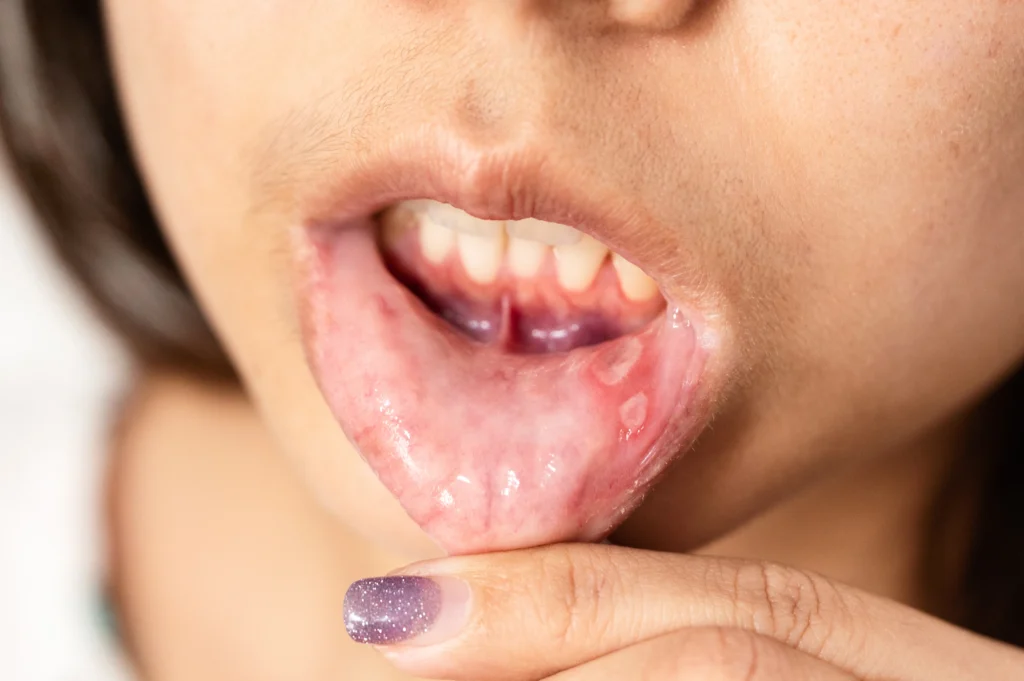Aphthous ulcers are common mouth sores that cause discomfort and make eating, drinking, or speaking painful. These sores, sometimes referred to as canker sores, form inside the mouth on spots such as the inner cheeks, lips, tongue, or gums. While they aren’t contagious, they can be irritating and often come back in some individuals. Understanding their causes, symptoms, and treatments can help in managing them effectively and preventing frequent flare-ups.
Aphthous ulcers develop when the protective lining inside the mouth becomes damaged or inflamed. Although the exact cause is not always clear, several triggers have been linked to their onset. These may involve accidental cheek bites, friction from dental braces, food sensitivities, or stress-related reactions.rewrite plagirism line with meaningfull same charater
Lack of essential nutrients, particularly iron, vitamin B12, and folic acid, can also increase the likelihood. Additionally, hormonal shifts, reduced immunity, or certain health conditions may contribute. Identifying potential triggers can help reduce how often and how severely these ulcers appear.

Dentists categorize aphthous ulcers into three main types, based on size and healing time:
Aphthous ulcers often begin with a tingling or stinging feeling before a visible sore develops. When present, the middle usually looks pale white, yellow, or gray, with a red border around it.Even small ulcers can react strongly to spicy, acidic, or salty foods.
Other symptoms may include:
Several factors can raise the likelihood of developing these sores:
By being mindful of these risks, you can make lifestyle changes that help lower your chances of repeated ulcers.
While it’s impossible to stop every occurrence, the following habits can help minimize outbreaks:
Keep hydrated and manage stress through practices like meditation or yoga.
Aphthous ulcers usually improve without treatment in about one to two weeks. If pain is intense or affects daily activities, treatment may be necessary.
Home Remedies
Over-the-Counter Options
Mouth rinses with antiseptic ingredients can ease discomfort and reduce swelling. Numbing gels or protective pastes can also provide relief.
Professional Dental Treatments
For more stubborn or serious cases, a dentist might suggest:
Consult a dental professional if:
Seeking early care can speed up healing and rule out more serious conditions.
Recurring aphthous ulcers may sometimes point to underlying medical problems such as digestive disorders, immune system conditions, or significant vitamin deficiencies. This is why frequent or severe mouth sores should be properly assessed by a healthcare provider.
Good daily oral care reduces the likelihood of mouth sores. Brush teeth gently twice a day, floss regularly, and use a mouthwash that’s free of alcohol. Visiting your dentist regularly allows early detection and management of issues that could cause irritation or ulcers.
Aphthous ulcers are common but can be controlled with consistent oral care, awareness of triggers, and timely treatment. While most heal on their own, persistent or severe cases need professional attention. For reliable care and tailored solutions to mouth sore problems, visit the Best Dental clinic in Kphb Hyderabad for lasting relief.
Don’t allow mouth ulcers to disrupt your everyday activities. Book an appointment with Unidental today for skilled and gentle treatment of aphthous ulcers and other oral health concerns.
Yes, if caused by HSV-1, they are highly contagious, especially during the blister stage. Avoid close contact until fully healed.
Most blisters heal within 7–14 days, though antiviral treatment can shorten recovery time.
Yes, stress can weaken the immune system, triggering the reactivation of dormant herpes viruses.
No, cold sores appear outside the mouth and are caused by a virus, while canker sores occur inside the mouth and are not contagious.
Avoid spicy, acidic, or salty foods, as well as touching or picking at the blister, which can delay healing and spread infection.
Hyderabad : +91 6305 971445
Anantapur: +91 70758 90089
Goa: +91 83266 32500
Mon to Sat 10:00AM to 8:00PM
Sun 10:00AM to 12:00PM
Lorem ipsum dolor sit amet, consectetur adipiscing elit. Ut elit tellus, luctus nec ullamcorper mattis, pulvinar dapibus leo.

Our goal is to provide friendly, caring dentistry with the highest standards in general, cosmetic, and specialist treatments. We strive to be the best dental hospital for comprehensive oral care.
We use advanced dental technology to deliver safe, precise, and painless treatments for every patient.